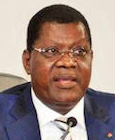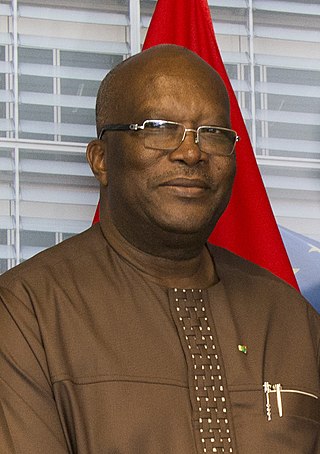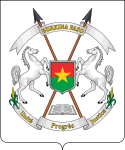
The Politics of Burkina Faso takes place in a framework of a semi-presidential republic, whereby the Prime Minister of Burkina Faso is the head of government, and of a multi-party system. The President of Burkina Faso is the head of state. Executive power is exercised by both the President and the Government. Legislative power is vested in both the government and parliament. The party system was dominated by the Congress for Democracy and Progress (CDP) until the 2014 Burkinabé uprising. Since then, the CDP has lost influence. The Judiciary is independent of the executive and the legislature. The Economist Intelligence Unit rated Burkina Faso an "authoritarian regime" in 2022.

The history of Burkina Faso includes the history of various kingdoms within the country, such as the Mossi kingdoms, as well as the later French colonisation of the territory and its independence as the Republic of Upper Volta in 1960.

Youssouf Ouédraogo was a Burkinabé politician. In 1992 he became the first Prime Minister of Burkina Faso since 1983, serving from 16 June 1992 to 22 March 1994. Ouédraogo, a member of the ruling Congress for Democracy and Progress (CDP), later served as Minister of State for Foreign Affairs from January 1999 to June 2007.

The Congress for Democracy and Progress was the ruling party in Burkina Faso from 1996 until the overthrow of Blaise Compaoré in 2014.

Burkina Faso elects on the national level a head of state – the president – and a legislature. The president is elected for a five-year term by the people. The National Assembly has 127 members, elected for a five-year term by proportional representation. Burkina Faso has held democratic elections since 1965. The history of elections has been slightly inconsistent, with the government dynamically changing at the hands of various coups, constitutional changes, and boycotts from various political parties. In 2015, the country experienced its first peaceful and fair election ever. Corruption plagued Burkina Faso's presidential elections for 50 years, but following a coup overthrowing Blaise Compaoré, the nation has seen more democratic and less corrupt electoral processes. Terrorism has played a substantial role in Burkina Faso's elections, with candidates running on the promise to keep the nation safe from the rise of Islamic jihadism they experienced in the 2010s. Historically, a few different parties have held power in Burkina. The Organization for Popular Democracy – Labour Movement was former president Compaoré's party affiliation, and thus they held power from 1987 to 2014. His party took power through a coup, and in 2014 also lost their control when the Regiment of Presidential Security overthrew the government.

Roch Marc Christian Kaboré is a Burkinabé banker and politician who served as the President of Burkina Faso from 2015 until he was deposed in 2022. He was the Prime Minister of Burkina Faso between 1994 and 1996 and President of the National Assembly of Burkina Faso from 2002 to 2012. Kaboré was also president of the Congress for Democracy and Progress (CDP) until his departure from the party in 2014. He founded the People's Movement for Progress party that same year.
Bénéwendé Stanislas Sankara is a Burkinabé politician and the President of the Union for Rebirth/Sankarist Movement (UNIR/MS) party.

Parliamentary elections were held in Burkina Faso on 5 May 2002. The result was a victory for the ruling Congress for Democracy and Progress (CDP), which won and 57 of the 111 seats in the National Assembly.

The unicameral National Assembly is Burkina Faso's legislative body. In 1995, it became the lower house of a bicameral Parliament, but the upper house was abolished in 2002. The upper house was to have been restored under the name "Senate" in the June 2012 constitutional amendments. This revision was never executed due to an extended and unresolved political confrontation over the Senate's establishment, which left the country effectively with a unicameral legislature as of the October 2014 constitutional crisis.

Parliamentary elections were held in Burkina Faso on 6 May 2007. The result was a victory for the ruling Congress for Democracy and Progress (CDP), which won 73 of the 111 seats in the National Assembly.

Alain Bédouma Yoda is a Burkinabé politician. He served in the government of Burkina Faso as Minister of Transport and Tourism from 1997 to 2000, Minister of Trade from 2000 to 2002, Minister of Health from 2002 to 2008, and Minister of State for Foreign Affairs and Regional Cooperation from 2008 to 2011. He was President of the Parliamentary Group of the Congress for Democracy and Progress (CDP) from 2013 to 2014.

Parliamentary elections were held in Burkina Faso on 24 May 1992. They were the first parliamentary elections held in the country since 1978, and the first to be held under the 1991 constitution. The result was a victory for the Organization for Popular Democracy – Labour Movement, which won 78 of the 107 seats in the National Assembly.

Parliamentary elections were held in the Republic of Upper Volta on 7 November 1965. The country had been a one-party state since 1960, with the Voltaic Democratic Union–African Democratic Rally as the sole legal party. It therefore won all 75 seats in the National Assembly. Voter turnout was 97.4%.

Parliamentary elections were held in the Republic of Upper Volta on 20 December 1970, following the restoration of multi-party democracy in a referendum earlier in the year. The result was a victory for the former sole legal party, the Voltaic Democratic Union–African Democratic Rally, which won 37 of the 57 seats in the National Assembly. Voter turnout was 48.3%.

Parliamentary elections were held in Upper Volta on 30 April 1978. They followed a constitutional referendum the previous year, which came about as a result of the 1974 military coup. A total of 367 candidates contested the elections.

Parliamentary elections were held in Burkina Faso on 2 December 2012. They were the first elections held since the National Assembly dissolved the National Electoral Commission in 2011, following fraud allegations concerning the 2010 presidential elections. Municipal elections for over 18,000 councillors were held simultaneously. The elections were held amidst a period of political uncertainty, following protests against President Blaise Compaore's regime.

General elections were held in Burkina Faso on 29 November 2015. The elections were the first national elections in the country since the 2014 Burkinabé uprising and the departure of President Blaise Compaoré, who had ruled Burkina Faso for 27 years. The party of former President Compaoré, the Congress for Democracy and Progress, was banned from presenting a presidential candidate in the presidential elections but was still able to participate in the parliamentary election.

A constitutional referendum has been planned to be held in Burkina Faso since 2019. Shortly before his reelection in November 2020, President Kaboré, who first initiated the project for a new constitution as part of his 2015 campaign, called for the referendum to be held in 2021. If approved, the new constitution would end the Fourth Republic created in 1991.

General elections were held in Burkina Faso on 22 November 2020 to elect the President and National Assembly. In the presidential elections, incumbent president Roch Marc Christian Kaboré of the People's Movement for Progress was re-elected in the first round with 57.7% of the vote, avoiding the need for second round. The main campaign focus of the major presidential candidates was the growing insecurity in the country with the rise in terrorism and ethnic violence.







